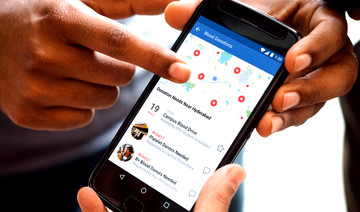KARACHI: Facebook has linked up with Election Commission of Pakistan to prevent elections from abuse, to counter fake news and address the specific challenges faced by social media users in the country.
“There are people who want to abuse the platform to harm the democratic process. This is something Facebook is absolutely committed to preventing, and is taking a number of steps to protect and preserve the integrity of the upcoming elections around the world. Pakistan is no exception,” the company said in its official statement.
More than 32 million — 15.9 percent of the country’s population — were registered users of Facebook in Pakistan at the end of last December, and the number is rising with the increasing penetration of mobile broadband internet services, according to Internet World Stats.
In the absence of any effective mechanism to verify material being uploaded on social media plaforms, the users often remain confused. Verification of material still remains a tough challenge, not only for common users, but for authorities too.
Sometimes mainstream media in Pakistan follows social media by giving importance to any issue that started there.
“We know that misinformation is harmful to the community and makes the world less (well) informed, particularly in the context of elections. We can't combat false news alone — we believe it requires a concerted effort across industry, academics, civil society and government, but we are absolutely committed to playing our part,” the company said.
“We will begin Third Party Fact Checking to our community in Pakistan, in partnership with AFP. When fact-checkers rate a story as false, we significantly reduce its distribution in News Feed — dropping future views on average by more than 80 percent. Pages and domains that repeatedly share false news will also see their distribution reduced and their ability to monetise and advertise removed,” the company added.
“There are only 15 percent social media users in the country, but when something abusive is posted or uploaded on social media websites, others also get the information from the users, which multiplies the impact and makes things worse,” Ahmad Bilal Mahboob, President of Pakistan Institute of Legislative Development and Transparency (PILDAT), a think tank that works to promote democracy, told Arab News.
Measures to check authenticity of material is an encouraging step, especially when there is less time for relevant person to clarify his position.
“Elections are just around the corner and there will be less time for contradiction or clarification if something misleading is floated about any political party or any other personality that can impact election either way,” the PILDAT president added.
Facebook said that it is also working to secure candidate and party pages to protect them from hacking and impersonation, and will be sending out security emails to administrators of such pages, as well as launching an election integrity website for candidates and parties in Pakistan.
Millions of fake accounts are major distributors of harmful and misleading content.
“Our technical systems to make it easier to respond to reports of abuse, detect and remove spam, identify and eliminate fake accounts, and prevent accounts from being compromised. In first quarter of this year, we removed nearly six million fake accounts globally, 98.5 percent of which we detected before anyone reported them to us”, Facebook noted.
However, some analysts doubt about the ability of the social networking service company to effectively remove and counter fake news in Pakistan. “The founder of Facebook himself had to apologies for thendata breach. How could fake news that goes viral and causes substantial damage to the targeted party or person be effectively removed (in Pakistan) when it was not done in the US or Europe?” Akhtar Baloch, senior analyst and blogger, challenged.
IT experts interpret Facebook’s move as a sign of its growing interest in Pakistan that may lead up to social networking company’s physical presence in Pakistan in future.
“It is very positive step in a sense that Facebook is recognising Pakistan as a potential region and is contributing towards social development by engaging with local elements,” said Badar Khushnood, former country consultant of Facebook, Google and Twitter.
Facebook said the company was increasing the number of people working on safety and security issues around the world to 20,000 by the end of the year, including in Pakistan, in a bid to help detect and prevent malign content on Facebook.













